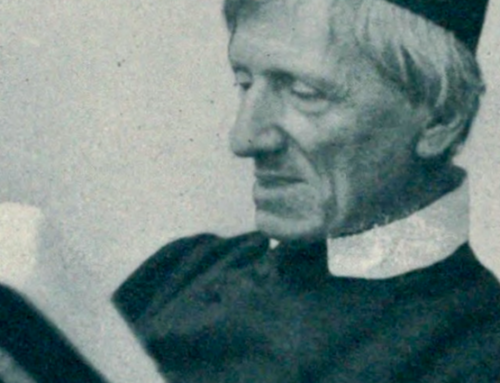Seventy-five years after the publication of C.S. Lewis’ The Abolition of Man, it is safe to say that the scientists and technologists and state makers and educational institutions and corporations have continued on the deadly path of making man not in the image of God, as manifested in nature, but in the image of some men, as manipulated by nature.
 What do the progressives really hope to achieve? And, to what end, if there really is an end? And, by what standard? And, how would we measure the results?
What do the progressives really hope to achieve? And, to what end, if there really is an end? And, by what standard? And, how would we measure the results?
As mentioned in my previous essays here at The Imaginative Conservative regarding the seventy-fifth anniversary of the masterpiece, The Abolition of Man, its author C.S. Lewis feared that “progress” was really a kind, propagandistic term meaning—intentionally or unwittingly—power. It is, as Lewis correctly notes, the “magician’s bargain.” With the sale of our soul, we get some power. When the progressives (materialists all) spoke and wrote of “nature,” they did not mean purpose or end, and they did not mean essence. Instead, they meant the actual physical world, manipulated through science, numbers, and calculations. Sadly, they see persons not as persons, but as people, mere material to be manipulated, just as nature is manipulated. Let’s be honest, Lewis suggests: “What we call Man’s power over Nature turns out to be as power exercised by some men over other men with Nature as its instrument.” One must recognize that for any one generation to shape itself or delimit itself—whether through birth control, sterilization, intellectual and emotional propaganda, genetic manipulation, or eugenics—it is acting the tyrant over all future generations. In their hubris, those manipulating argue that they are manipulating for the sake of the greater good, but they are really manipulating because they have convinced themselves as to exactly how man should look. That is, they ignore that man has been made by the creator as Imago Dei, a particular expression of a universal principle and truth. Instead, they believe that through their own understanding they know what a man should be and how he should act and what he should desire or not. “Each new power won by man is a power over man as well,” Lewis writes.
The progressives might very well be reaching the end state, a state in which this generation determines the fate of every future generation. “The final stage is come when Man by eugenics, by pre-natal conditioning, and by an education and propaganda based on a perfect applied psychology, has obtained full control over himself,” he laments. Diabolic, to be sure, there have always been those throughout history who have sought to make the world in their own personal image. The difference between those who desired to do so in the year 543 and those in 1943 should be obvious. “The man-molders of the new age will be armed with the powers of an omnicompetent state and an irresistible scientific technique: we shall get at last a race of conditioners who really can cut out all posterity in what shape they please.”
Of this last point, imaginative conservatives and practicing Christians should take particular note. Lewis’ argument resembles Christopher Dawson’s in the 1930s and Robert Nisbet’s in the 1940s that the modern nation state is something quite different from the states of the ancient and medieval worlds. Quite possibly, the new state—this new leviathan as Dawson argued—is something beyond what even St. Paul understood when he cautioned the Romans to accept the authority of the political realm as given by God. The new leviathan—armed with mass communications, educational institutions, and scientific methods—resembles much more a satanic church than it does a legitimate political authority. Thus, Romans 13 might no longer apply to the modern Christian.
The progressives are no longer interested in merely possessing the body of a man—as states have done since time immemorial through conscription; they want to possess the very soul of the man, even as they deny the very existence of the soul. Traditionally, priests and professors have “initiated the young neophyte into the mystery of humanity which over-arched him and them alike. It was but old birds teaching young birds to fly. This will be changed,” Lewis continues. “Values are now mere natural phenomena. Judgements of value are to be produced in the pupil as part of the conditioning.” The progressives want not merely to divorce themselves from the restraint of nature herself, they want to divorce themselves from the very laws of nature, believing themselves beyond good and evil.
‘Why should you suppose they will be such bad men?’ But I am not supposing them to be bad men. They are, rather, not men (in the old sense) at all. They are, if you like, men who have sacrificed their own share in traditional humanity in order to devote themselves to the task of deciding what ‘Humanity’ shall henceforth mean. ‘Good’ and ‘bad’, applied to them, are words without content: for it is from them that the content of these words is henceforward to be derived.
In essence, though, by stepping beyond good and evil, the progressives are declaring themselves separate from humanity at large. “It is not that they are bad men,” Lewis explains. “They are not men at all. Stepping outside the Tao, they have stepped into the void. Nor are their subjects necessarily unhappy men.” The irony is palpable. “They are not men at all: they are artefacts. Man’s final conquest has proved to be the abolition of Man.” They, symbolically, either castrate themselves or they commit suicide.
Further, Lewis cautions, one should not think in terms of simple right or left. When it comes to progressivism and conditioning, democrats are just as bad as communists and fascists. The real divide will be between those who believe in the natural law and those who do not.
What most moderns do not realize, Lewis warns, is that magic and science are more related to one another than most—especially scientists—would like to admit. Popular opinion believes that magic arose with Christianity during the Middle Ages. In fact, “there was very little magic in the Middle Ages: the sixteenth and seventeenth centuries are the high noon of magic. The serious magical endeavour and the serious scientific endeavour are twins: one was sickly and died, the other strong and throve. But they were twins.” The Middles Ages, following the Socratic understandings of the ancient world, sought conformity with the Natural Law, while both magic and science seek to dominate and manipulate it. The misunderstanding of seeing science and magic in opposition is, itself, a product of progressivism.
But if the scientists themselves cannot arrest this process before it reaches the common Reason and kills that too, then someone else must arrest it. What I most fear is the reply that I am ‘only one more’ obscurantist, that this barrier, like all previous barriers set up against the advance of science, can be safely passed. Such a reply springs from the fatal serialism of the modern imagination—the image of infinite unilinear progression which so haunts our minds.
The only possibility of derailing this fatal way of thinking is to return to first principles, right reason, and the Natural Law, to see things as they are, not as we wish them to be.
Seventy-five years later, it is safe to say—however lamentably—that the scientists and technologists and state makers and educational institutions and corporations have not ignored Lewis’ Abolition of Man. They have continued on the deadly path of making man not in the image of God, as manifested in nature, but in the image of some men, as manipulated by nature.
The Imaginative Conservative applies the principle of appreciation to the discussion of culture and politics—we approach dialogue with magnanimity rather than with mere civility. Will you help us remain a refreshing oasis in the increasingly contentious arena of modern discourse? Please consider donating now.
The featured image is a portrait (1915) painted by John Cooke. It features in the back row (left to right) F.O. Barlow, G. Elliot Smith, Charles Dawson, Arthur Smith Woodward, and in the front row A.S. Underwood, Arthur Keith, W. P. Pycraft, and Sir Ray Lankester, with a painting of Charles Darwin on the wall. It is in the public domain and appears here courtesy of Wikimedia Commons.







Leave A Comment